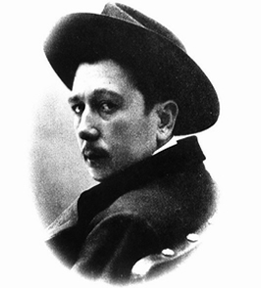Радоје Домановић (1873-1908)
 САТИРИЧНИ ПРИПОВЕДАЧ
САТИРИЧНИ ПРИПОВЕДАЧ
Рођен је 16. фебруарa (или 4. фебруара по јулијанском календару) 1873. године у породици сеоског учитеља у селу Овсиште код Крагујевца. Детињство је провео у суседном селу Јарушицама, где је завршио и основну школу. Гимназију је завршио у Крагујевцу, a Филозофски факултет на Великој школи у Београду. Као професор српског језика и кљижевности радио је у гимназијама у Врању, Пироту и Лесковцу.
Био је добар предавач, тактичан и речит.
Својим књижевним судбинама показују блискост баш са оним странама свакодневног живота, које су садржај, предмет и грађа тих приповедака. Тек прецизно установљен редослед њиховога појављивања омогућује сваковрсне закључке о њиховим изворима, о путевима њиховог настојања, о преплитањима и међусобним утицајима, па и о њиховој вредности и значају у целини пишчевог опуса.
Због политичких уверења је прогањан, премештан и отпуштан са посла. После пада режима краља Александра Обреновића (1903.), незадовољан зато што се у земљи мало тога променило, покреће политички лист "Страдија", у којем покушава да се бори против мана новог режима.
На први поглед живот Радоја Домановића изгледа прилично једнолик, монотон, без крупних догађаја и снажних преокрета Међутим, површан поглед вара и ако се мало дубље продре у токове живота овог нашег сатиричара, наћи ће се доста преломних тренутака и много пркоса. Радоје Домановић је први прави сатиричар међу српским реалистима. Сатира је његово главно обележје а значајније његове приповетке су:
- Вођа
- Данга
- Страдија
- Мртво море
- Краљевић Марко по други пут међу Србима
- Размишљање једног обичног српског вола
- Укидање страсти
- Позорише у паланци
- Гласам за слепца
- Не разумем
Разочаран, одавао се све више боемском животу.
Умро је у 35-oj години живота, 4. августа 1908. у Београду.
Biography
Domanović was born in a village Ovsište which is located near Kragujevac. He attended a gymnasium in Kragujevac. Some of his teachers were Pera Đorđević and Sreten Stojković, followers of Svetozar Marković, who were arrested for an attempt to take control of the local government and displaying a red flag. From 1890 to 1894, Domanović studied at the history and philology department of the Great School in Belgrade. He read some of his first works to the members of a student organization Pobratimstvo.
In 1893, he published his first work, a short story "Na mesečini" ("In the Moonlight"), in a magazine Javor.
Two years later, he got his first post as a lecturer in a gymnasium in Pirot. There he met Jaša Prodanović, who was transferred to that school as a punishment. At that time, Domanović joined Republikanska stranka (The Republican Party), and got married to Natalija Ristić.
After nine months, he was transferred, as a punishment on request of his political rivals, to a gymnasium in Vranje. On the same account, after a year in Vranje, he was transferred to Leskovac.
Following a critical speech on the position of teachers in 1898, he was dismissed from his post, along with his wife. As a response, he wrote a short story "Ukidanje strasti" ("Abolishing Passion").
In 1899, he published two collections of short stories and his famous story "Danga" first appeared. The following year, he got a post as a clerk in the State's Archive. In 1902, after he published "Stradija", he was again dismissed from his post. He started writing editorials for magazine Odjek.
After a coup in 1903, Domanović returned to his post, and soon got a stipendy to work on his stories. It was rumoured that the coup saved his life, since he was on a list for liquidation of the old government. In 1904, he started a magazine "Stradija", that had 35 editions. The following year, he was appointed to the State press. He died in 1908 of tuberculosis]survived by his wife and two children Zoran and Danica.
Short stories
Domanović lived for only 35 years and did not publish much work. Some of his more famous stories are:
- "Danga" is a story about the author's dream of visiting an imaginary country where all people blindly follow their leaders. After all of the citizens were branded on the forehead, without complaints, the story culminates when the narrator proclaims that he, as a Serb, is much braver then anybody and requests to be branded ten times.
- "Ukidanje strasti" ("Abolishing Passion") is a satirical fiction about a legislation that outlawed passion, after which people stopped doing things like smoking, drinking, or taking political participation.
- "Razmišljanje jednog običnog srpskog vola" ("Reasoning of an Ordinary Serbian Ox"), criticizes Serbian misuse of their history and tradition.
- "Kraljević Marko po drugi put među Srbima" ("Marko Kraljević Among Serbs For the Second Time"), is a story of a return of an epical Serbian hero.
- "Mrtvo more" ("Dead Sea") is a story about resistance of masses against any kind of progress.
- "Vođa" ("The Leader") is a story about people who chose a person they never saw before to lead them to a better place. After suffering through a long trip, they realized that their leader was blind.
 САТИРИЧНИ ПРИПОВЕДАЧ
САТИРИЧНИ ПРИПОВЕДАЧ